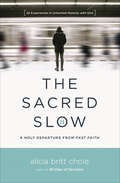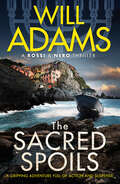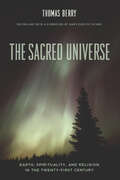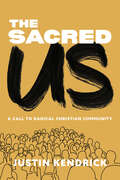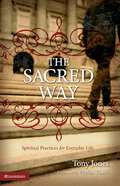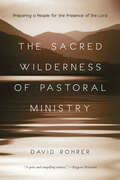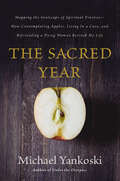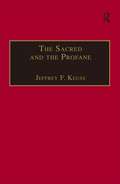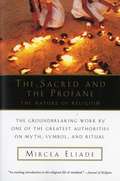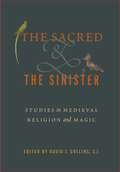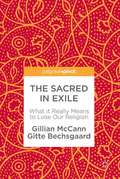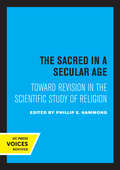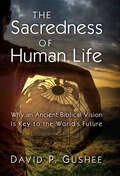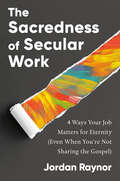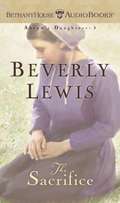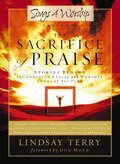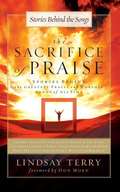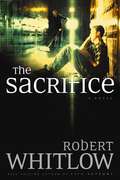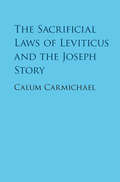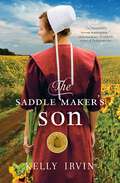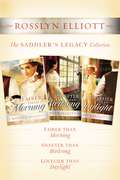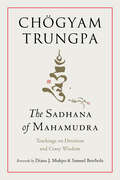- Table View
- List View
The Sacred Slow: A Holy Departure from Fast Faith
by Alicia Britt CholeTired of quick fixes and fast faith? The Sacred Slow is an invitation to unhurried honesty before God. If yesterday&’s word was simple, tomorrow&’s word will be slow.Our culture is shifting from fast food to healthy food both physically and spiritually. Self-care, soul-care, life coaches, and spiritual retreats all show our dissatisfaction in quick fixes and fast faith. The Sacred Slow is an invitation to unhurried honesty before God.Formatted as 52 experiences, The Sacred Slow reminds readers on every page that God never wanted to use them—He always wanted to love them. The overflow of Dr. Alicia Britt Chole&’s more than thirty years as a spiritual mentor to leaders and learners as well as her personal, practical, and penetrating tone will guide you to a richer, more life-giving relationship with God.Perfect for use as a devotional or in small groups, each chapter features:A short, unexpected readingTwo options for application—a thought focus or a heart exerciseEncouragement to develop growing, sustainable intimacy with GodWhether you&’re exhausted by emptiness or worn from weariness, you&’ll discover healing and restoration in these pages. In this age of distraction, learn to slow down and reorient your life to learn, grow, and experience God as never before.
The Sacred Spoils (The Rossi & Nero Thrillers)
by Will AdamsThe race to uncover history&’s greatest lost fortune begins in a breathtaking conspiracy thriller from the author of The Alexander Cipher. To the victor go the spoils . . . Historian Carmen Nero, in southern Italy to help a friend search for ancient riches, is caught up in the murderous schemes of the Calabrian Mafia. Cesco Rossi, a quick-witted conman on the run from a brutal group of neo-Nazis, is about to be confronted by his tragic past. Israeli Professor Zara Gold is on a mission to find Judaism&’s most sacred relic. For the tomb of Alaric I, the Visigoth king who sacked and looted Rome of its most fabulous treasures, is on the point of being revealed. And who knows what secrets may lie within? An astounding and twisting mystery that will delight fans of Dan Brown, Clive Cussler and Scott Mariani. Praise for Will Adams&’ The Alexander Cipher &“A razor-edged thriller that delves deeply into crumbling tombs and ancient secrets. Explosively paced and tautly told.&” —James Rollins, #1 New York Times–bestselling author &“A resourceful and appealing hero, and . . . the action crackles along with betrayals, vendettas, and revelations galore.&” —Daily Mail &“The author does an excellent job of keeping the story moving at a brisk clip while giving us all the historical background we require to understand what all the fuss is about . . . smartly constructed twists. Surprisingly, considering its high quality, this is Adams&’ first novel.&” —Booklist (starred review)
The Sacred Universe: Earth, Spirituality, and Religion in the Twenty-First Century
by Thomas BerryA leading scholar, cultural historian, and Catholic priest who spent more than fifty years writing about our engagement with the Earth, Thomas Berry possessed prophetic insight into the rampant destruction of ecosystems and the extinction of species. In this book he makes a persuasive case for an interreligious dialogue that can better confront the environmental problems of the twenty-first century. These erudite and keenly sympathetic essays represent Berry's best work, covering such issues as human beings' modern alienation from nature and the possibilities of future, regenerative forms of religious experience. Asking that we create a new story of the universe and the emergence of the Earth within it, Berry resituates the human spirit within a sacred totality.
The Sacred Universe: Earth, Spirituality, and Religion in the Twenty-First Century
by Thomas Berry&“Dedicated readers of ecology, theology, or religious philosophy will want to savor each one [of these essays]&” from the renowned environmental thinker (Library Journal). A leading scholar, cultural historian, and Catholic priest who spent more than fifty years writing about our engagement with the Earth, Thomas Berry possessed prophetic insight into the rampant destruction of ecosystems and the extinction of species. In this book he makes a persuasive case for an interreligious dialogue that can better confront the environmental problems of the twenty-first century. These erudite and keenly sympathetic essays represent Berry&’s best work, covering such issues as human beings&’ modern alienation from nature and the possibilities of future, regenerative forms of religious experience. Asking that we create a new story of the universe and the emergence of the Earth within it, Berry resituates the human spirit within a sacred totality. &“This book addresses how the history and diversity of world religions offer ways to engage with Earth; how it is necessary to connect with a spirituality that is Earth derived; how science can be in conversation with the religious sensibilities of wonder and awe; and how our relationship to the natural world is crucial to our spirituality. In the earliest essays, Berry sounds most optimistic and urges readers to reconcile modern impulses and technology with religious traditions.&”—Publishers Weekly &“Thomas Berry demonstrates in these papers the qualities he calls for: humanist vision and imagination.&”—Resurgence
The Sacred Us: A Call to Radical Christian Community
by Justin KendrickFor every person who has felt lonely or isolated, The Sacred Us explores a new way of living through the practice of biblical community. In a world that celebrates individuality and autonomy, too many of us struggle to form deep, meaningful relationships. Loneliness is the norm, rich friendships are rare, and the church is no exception. We long for real community but often don&’t know how to get there. What will it take to develop healthy friendships? The Bible gives us a compelling blueprint for community, but it must be built on more than shared interests or Sunday-morning smiles. This book explores the substance of biblical community through seven principles: Proximity that provides opportunityVulnerability that creates connectionDiscipleship that sets directionFun that amplifies graceMission that drives adventureSacrifice that matures loveBoundaries that sustain growth These principles seek to guide the reader beyond loneliness and isolation into a life of rootedness and connection.
The Sacred Way: Spiritual Practices for Everyday Life
by Tony JonesBroaden your spiritual horizons. How has spirituality changed in the last 500, 1,000, or even 2,000 years? How can ancient approaches to faith help my relationship with God today? In The Sacred Way, popular author and speaker Tony Jones mines the rich history of 16 spiritual disciplines that have flourished throughout the ages and offers practical tips for implementing them in your daily life. Find encouragement and challenge through time-tested disciplines such as: •Silence and solitude •The Jesus prayer •Meditation •Pilgrimage Explore these proven approaches to deepening your faith. As you do, your way of living your spiritual life will never be the same.
The Sacred Wilderness of Pastoral Ministry: Preparing a People for the Presence of the Lord
by David RohrerPastors often find themselves struggling to survive in the wilderness of the contemporary church scene. How do they remain faithful in light of the marginalization of organized religion, denominational strife, rapid demographic change, falling numbers and a general malaise among church members? Many pastors feel helpless, others hopeless. Sociologists and pollsters diagnose the problem but can't seem to come up with a solution. Is there hope? Author and pastor David Rohrer believes there is. John the Baptist also lived in the wilderness, yet crowds journeyed there to hear him. Why? Because John "affirmed what people already knew: that they were in desperate need of something more than the mundane practices of a religion that had been cut off from its source of life." John called people to remember their covenant relationship with God, which was established in the wilderness, and to let God guide them once again across the Jordan and into the Promised Land. Pastors, says Rohrer, "don't primarily exist to build and maintain the institution of the church. We exist to do a particular work through the church. In short, we don't simply have an institution to create, refine or maintain; we have a gospel to preach." John's prophetic voice prepared hearts to be receptive to Christ's work among them, to be transformed by the power of God. Herein lies hope! Using illustrations from everyday church life and decades of ministry experience, Rohrer carefully crafts a lively and realistic pastoral theology for ministry in the sacred wilderness. If you are a new pastor you have a sure guide here. If you are a veteran preacher you'll find just the refresher course you need to invigorate your ministry.
The Sacred Year: Mapping The Soulscape Of Spiritual Practice -- How Contemplating Apples, Living In A Cave And Befriending A Dying Woman Revived My Life
by Mike Yankoski"In his life and writing, Michael Yankoski walks a tightrope between action and contemplation, and, behold, in ways we can all learn from, he manages to find a sort of essential balance."—Philip Yancey, author of What's So Amazing About Grace"This book is a joy to the soul and a delight to the heart. It is destined to become a classic within the genre of contemporary spiritual and religious writing."—Phyllis Tickle, compiler of The Divine HoursFrustrated and disillusioned with his life as a Christian motivational speaker, Michael Yankoski was determined to stop merely talking about living a life of faith and start experiencing it. The result was a year of focused engagement with spiritual practices—both ancient and modern—that fundamentally reshaped and revived his life. By contemplating apples for an hour before tasting them (attentiveness), eating on just $2.00 a day (simplicity), or writing letters of thanks (gratitude), Michael discovered a whole new vitality and depth through the intentional life.Guided by the voice of Father Solomon—a local monk—Yankoski's Sacred Year slowly transforms his life. Both entertaining and profound, his story will resonate with those who wish to deepen their own committed faith as well as those who are searching—perhaps for the first time—for their own authentic encounter with the Divine.
The Sacred and the Profane: Contemporary Demands on Hermeneutics
by Jeffrey F. KeussHermeneutics continues to be an area of interest to many, yet recent discussions in hermeneutic theory have turned toward fringe areas - whether found in realms of post-structuralism or radical orthodoxy - that have resulted in a 'forgetfulness' of one of hermeneutics' key thinkers, Immanuel Kant. This book seeks to reaffirm Kant's place as a central thinker for hermeneutics and to challenge and support prevailing criticisms. It has been argued that Kant merely offers a theory of the subjective universality of a rational aesthetic judgement where only reason connects us to the transcendent and sensation is only a subjective and confusing factor that distracts and distorts reason. This position is challenged as well as supported by the contributors to this book, scholars who bring key issues in hermeneutics to light from American, British, and continental perspectives, grounded in questions and concerns germane to today's culture. The discussion of hermeneutics is framed as being deliberately an interdisciplinary, cross-cultural affair. The Sacred and the Profane provides a welcome addition to contemporary discussions on hermeneutic theory through its assertion that there is still a need to support a critical approach to hermeneutics after Kant.
The Sacred and the Profane: The Nature of Religion
by Mircea EliadeA noted historian of religion traces manifestations of the sacred from primitive to modern times, in terms of space, time, nature and the cosmos, and life itself.
The Sacred and the Sinister: Studies in Medieval Religion and Magic
by David J. Collins, S. J.Inspired by the work of eminent scholar Richard Kieckhefer, The Sacred and the Sinister explores the ambiguities that made (and make) medieval religion and magic so difficult to differentiate. The essays in this collection investigate how the holy and unholy were distinguished in medieval Europe, where their characteristics diverged, and the implications of that deviation.In the Middle Ages, the natural world was understood as divinely created and infused with mysterious power. This world was accessible to human knowledge and susceptible to human manipulation through three modes of engagement: religion, magic, and science. How these ways of understanding developed in light of modern notions of rationality is an important element of ongoing scholarly conversation. As Kieckhefer has emphasized, ambiguity and ambivalence characterize medieval understandings of the divine and demonic powers at work in the world. The ten chapters in this volume focus on four main aspects of this assertion: the cult of the saints, contested devotional relationships and practices, unsettled judgments between magic and religion, and inconclusive distinctions between magic and science.Freshly insightful, this study of ambiguity between magic and religion will be of special interest to scholars in the fields of medieval studies, religious studies, European history, and the history of science.In addition to the editor, the contributors to this volume are Michael D. Bailey, Kristi Woodward Bain, Maeve B. Callan, Elizabeth Casteen, Claire Fanger, Sean L. Field, Anne M. Koenig, Katelyn Mesler, and Sophie Page.
The Sacred and the Sinister: Studies in Medieval Religion and Magic
by David J. Collins, S.J.Inspired by the work of eminent scholar Richard Kieckhefer, The Sacred and the Sinister explores the ambiguities that made (and make) medieval religion and magic so difficult to differentiate. The essays in this collection investigate how the holy and unholy were distinguished in medieval Europe, where their characteristics diverged, and the implications of that deviation.In the Middle Ages, the natural world was understood as divinely created and infused with mysterious power. This world was accessible to human knowledge and susceptible to human manipulation through three modes of engagement: religion, magic, and science. How these ways of understanding developed in light of modern notions of rationality is an important element of ongoing scholarly conversation. As Kieckhefer has emphasized, ambiguity and ambivalence characterize medieval understandings of the divine and demonic powers at work in the world. The ten chapters in this volume focus on four main aspects of this assertion: the cult of the saints, contested devotional relationships and practices, unsettled judgments between magic and religion, and inconclusive distinctions between magic and science.Freshly insightful, this study of ambiguity between magic and religion will be of special interest to scholars in the fields of medieval studies, religious studies, European history, and the history of science.In addition to the editor, the contributors to this volume are Michael D. Bailey, Kristi Woodward Bain, Maeve B. Callan, Elizabeth Casteen, Claire Fanger, Sean L. Field, Anne M. Koenig, Katelyn Mesler, and Sophie Page.
The Sacred in Exile: What It Really Means To Lose Our Religion
by Gillian Mccann Gitte BechsgaardThis book addresses the fact that, for the first time in history, a large segment of the population in the western world is living without any form of religious belief. While a number of writers have examined the implications of this shift, none have approached the phenomenon from the perspective of religious studies. The authors examine what has been lost from the point of view of sociology, psychology, and philosophy of religion. The book sits at the nexus of a number of important debates including: the role of religion in public life, the connection between religion and physical and psychological well-being, and the implications of the loss of ritual in terms of maintaining communities.
The Sacred in a Secular Age: Toward Revision in the Scientific Study of Religion
by Phillip E. HammondThis title is part of UC Press's Voices Revived program, which commemorates University of California Press’s mission to seek out and cultivate the brightest minds and give them voice, reach, and impact. Drawing on a backlist dating to 1893, Voices Revived makes high-quality, peer-reviewed scholarship accessible once again using print-on-demand technology. This title was originally published in 1985.
The Sacredness of Human Life: Why an Ancient Biblical Vision Is Key to the World's Future
by David P. GusheeThis authoritative book is the most comprehensive examination ever of the sacredness of human life. Never before has one volume explored this subject in such a multifaceted way, encompassing biblical roots, theological elaborations, historical cases, and contemporary ethical perspectives. Tracing the concept of the sacredness of human life from Scripture through church history to the present day, David Gushee argues that viewing human life as sacred is one of the most precious legacies of biblical faith — albeit one that the church has too often failed to uphold. Besides providing a masterful historical survey, Gushee’s discussion covers the many current ethical challenges and perspectives that will impact the survival and flourishing of human life, including biotechnology, the death penalty, abortion, human rights, nuclear weapons, just war theory, women’s rights, and creation care.Gushee’s Sacredness of Human Life is a game-changing book that will set the standard for all future discussions of this key ethical concept.
The Sacredness of Questioning Everything
by David DarkThe freedom to question—asking and being asked—is an indispensable and sacred practice that is absolutely vital to the health of our communities. According to author David Dark, when religion won’t tolerate questions, objections, or differences of opinion, and when it only brings to the table threats of excommunication, violence, and hellfire, it does not allow people to discover for themselves what they truly believe. The God of the Bible not only encourages questions; the God of the Bible demands them. If that were not so, we wouldn’t live in a world of such rich, God-given complexity in which wide-eyed wonder is part and parcel of the human condition. Dark contends that it’s OK to question life, the Bible, faith, the media, emotions, language, government—everything. God has nothing to hide. And neither should people of faith. The Sacredness of Questioning offers a wide-ranging, insightful, and often entertaining discussion that draws on a variety of sources, including religious texts and popular culture. It is a book that readers will likely cherish—and recommend—for years to come.
The Sacredness of Secular Work: 4 Ways Your Job Matters for Eternity (Even When You're Not Sharing the Gospel)
by Jordan RaynorFrom a leading voice in the faith and work movement and author of Redeeming Your Time comes the revolutionary message that God sees our daily work—in whatever form it takes—with far more value than we ever imagined.&“The Sacredness of Secular Work does an extraordinary job of being both personally relevant and, more importantly, biblically faithful.&”—Randy Alcorn, New York Times bestselling author of HeavenDoes your work matter for eternity? Sadly, most believers don&’t think so. Sure, the 1 percent of the time they spend sharing the gospel with their co-workers matters. But most Christians view the other 99 percent of their time as meaning very little in the grand scheme of things. But that&’s not how God sees it. Jordan Raynor, a leading voice in the faith and work movement and bestselling author, offers a revolutionary message about how our daily jobs—from baristas and entrepreneurs to stay-at-home parent and coaches—have intrinsic and eternal value. In The Sacredness of Secular Work, he reveals unexpected ways our work truly matters. In these pages you&’ll discover• How a low regard of our work limits our understanding of God and His Kingdom • Inspiring ways your work can reveal God&’s kingdom on earth here and now • Surprising strategies for ensuring your vocation has an eternal legacy• Vital insights on what God&’s view of work tells us about heavenCombining research, Scripture, and storytelling, Jordan Raynor proves that work, in its diverse forms, is one of the primary activities that brings God delight. This biblical perspective will set you free to pursue your passions and skills and—perhaps for the first time—experience the Creator&’s delight in the work of your hands.
The Sacrifice (Abram's Daughters Series, #3)
by Beverly LewisLeah Ebersol has no choice but to believe the worst: Her older sister, Sadie--and Leah's own beloved Jonas--have betrayed her. Now, two years later, Leah still misses them both, though loyal neighbor Gid continues to bide his time. But when tragedy befalls the Ebersols, Leah must make a difficult choice.
The Sacrifice of Praise: Stories Behind the Greatest Praise and Worship Songs of All Time
by Lindsay TerryRead the inspiring tales that gave birth to fifty of today's most beloved worship songs.
The Sacrifice of Praise: Stories behind the Greatest Praise and Worship Songs of All Time
by Lindsay TerryRead the inspiring tales that gave birth to fifty of today's most beloved worship songs. Includes: "Shout To The Lord," "God Will Make A Way," "Surely The Presence Of The Lord," "Great Is The Lord," "Amazing Grace..."
The Sacrifice: The Trial, The Sacrifice, The List
by Robert WhitlowThe most powerful weapon against evil is sacrifice.Attorney Scott Ellis is defending Lester Garrison, a 16-year-old accused of opening gunfire on a Sunday afternoon church gathering.At the same time, Scott's volunteer work at the local high school brings him into contact with Kay Wilson, an English teacher and former girlfriend. Unknown to either of them, Catawba High School is not just a place of learning--it's a battleground for an age-old struggle between good and evil. On one side are praying students and a simple janitor with an extraordinary faith. On the other side is a deeply troubled young man intent on mass destruction.Caught in the middle, Scott and Kay learn that lasting victory will require the ultimate sacrifice.
The Sacrificial Laws of Leviticus and the Joseph Story
by Calum CarmichaelIn this study, Calum Carmichael offers a new assessment of the Joseph story from the perspective of the biblical laws in Leviticus 1-10. These sacrificial laws, he argues, respond to the many problems in the first Israelite family. Understanding how ancient lawgivers thought about Joseph's and his brothers' troubling behavior leads to a greater appreciation of this complicated tale. The study of the laws in Leviticus 1-10 in relation to the Joseph story provides evidence that all biblical laws, over 400, constitute commentary on issues in the biblical narratives. They do not, as commonly thought, directly reflect the societal concerns in ancient Israelite times. Through close reading and analysis, Carmichael reveals how biblical narrators and lawgivers found distinctive and subtle ways of evaluating a single development in a narrative from multiple perspectives. Thus, the sacrificial laws addressing idolatry, keeping silent about a known offense, confessing wrongdoing, and seeking forgiveness become readily understandable when reviewed as responses to the events in the Joseph story.
The Saddle Maker's Son: The Beekeeper's Son, The Bishop's Son, The Saddle Maker's Son (The Amish of Bee County #3)
by Kelly IrvinRebekah Lantz feels imprisoned by circumstances she didn’t create. Tobias Byler is haunted by regret. Can two young runaways from half a world away teach them the healing power of true family?Rebekah isn’t like her sister, but the watchful gaze of her family and small, close knit Amish community makes her feel as if she’s been judged and found lacking. The men avoid her and the women whisper behind her back. She simply longs for the same chance to be a wife and mother that her friends have.Tobias Byler only wants to escape feelings for a woman he knows he should never have allowed to get close to him. Moving with his family to isolated Bee County, Texas, seemed the best way to leave his mistakes behind. But even a move across the country can’t erase the past that accompanies his every thought.A surprise encounter with two half-starved runaway children forces both Rebekah and Tobias to turn to each other to help a sister and brother who have traveled thousands of miles in search of lives of unfettered peace and joy.In doing so, Rebekah and Tobias discover the key to forgetting the past is the one that will open the door to love and the future they both seek.
The Saddler's Legacy Collection
by Rosslyn ElliottThe Saddler's Legacy series now available in one volume! The Saddler's Legacy is an award-winning romance series based on historical events in the lives of the Hanby family, some of Westerville, Ohio's most celebrated citizens. Fairer than Morning Ann Miller dreams of a marriage proposal from her poetic suitor, Eli--until Will Hanby shows her that nobility is more than fine words. Sweeter than Birdsong Music offers Kate Winter sweet refuge from her troubles . . . but when she meets Ben Hanby she discovers that real freedom is sweeter. Lovelier than Daylight Susanna Hanby is a lady of principles who values family above all. Johann Giere seems to represent all she despises . . . but appearances can be deceiving.
The Sadhana of Mahamudra: Teachings on Devotion and Crazy Wisdom
by Chogyam TrungpaAn in-depth commentary on &“The Sadhana of Mahamudra,&” a visionary text from Chögyam Trungpa on surrendering, renunciation, and devotion.In 1968, while on retreat in a cave in Bhutan, Chögyam Trungpa revealed &“The Sadhana of Mahamudra,&” a terma text, or visionary teaching, that illuminated the problems of spiritual corruption and materialism. From that time on, his teachings were dedicated to providing his students with the wisdom and skill to overcome these problems in themselves and in the world.In later years, Chögyam Tungpa offered teachings to unpack the meaning of the practice. That extensive commentary is contained here, where he lays the groundwork we need to gain a deeper appreciation of this profound text and how it applies to our own lives and practice. As he states in the book, &“The sadhana is a prototype of how emotion and wisdom can work together.&”Previously published as Devotion and Crazy Wisdom, this new edition includes for the first time the text of the sadhana. Also included is an updated list of resources for further study, an index, a new foreword by Samuel Bercholz, and updated introductory material—including a new introduction from Carolyn Gimian discussing the significance of &“The Sadhana of Mahamudra.&”
